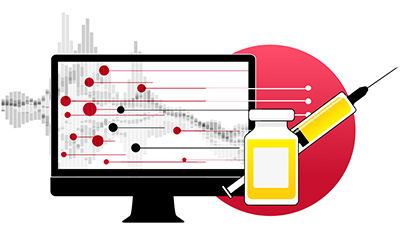Drug Development Research
 We specialize in utilizing modeling and simulation methods for dose optimization, discovering surrogate endpoints, securing study waivers, crafting study designs, delivering Model-Informed Evidence of Effectiveness, incorporating Model-Integrated Bioequivalence, and formulating pediatric study protocols.
We specialize in utilizing modeling and simulation methods for dose optimization, discovering surrogate endpoints, securing study waivers, crafting study designs, delivering Model-Informed Evidence of Effectiveness, incorporating Model-Integrated Bioequivalence, and formulating pediatric study protocols.
Read on to learn more about the projects that the Center for Translational Medicine is engaged in.
Projects at CTM
Artificial Blood Product Development
Decision: Can a shelf-stable, bio-synthetic whole-blood product be developed to be used for blood transfusions? We assessed the stability of the product and whether in vitro performance attributes and safety metrics were non-inferior to stored human blood
Guiding Dyslipidemia New Treatment
Decisions: What dose should be selected for the next Phase 2 study of obicetrapib, a CEPT inhibitor being developed for the treatment of dyslipidemia?
Information: A total of 364 subjects (healthy adults and adults with mild dyslipidemia) from 3 different studies (TA-8995-01, TA-8995-E02, and TA-8995-03) who received obicetrapib were available for PK/PD analysis. Robust and sparse PK and LDL-C/HDL-C levels were collected following a range of doses (1 mg to 150 mg).
Analysis: A 2-compartment model with a 4-compartment transit absorption was developed using NLME modeling. Individual predicted concentrations were leveraged to inform a sequential turnover PD model to describe the obicetrapib-LDL/HDL relationship. Simulations were performed with the final PK/PD model to inform dose selection.
Accelerating Generic Drug Development in Long Acting Injectables
Decisions: What framework should guide the implementation of model-integrated bioequivalence (MIBE) for generic drug development?
Information: A literature review was performed for population pharmacokinetics (pop-PK) models of long-acting injectables for which conventional bioequivalence approaches may be impractical. Depo-SubQ Provera 104 was chosen as the example product. A pop-PK model was developed from digitized PK data and summary level statistics.
Analysis: Modeling and simulation of BE trials were performed to develop a framework for planning & conducting abbreviated BE trials, while assessing BE on simulated full BE trials.
Expediting Medical Counter Measure Development using AI/ML
Decision: Can we reduce the failure rate of medical counter measure (MCM) trials for the treatment of hematopoietic acute radiation syndrome? We developed an AI/ML based tool called ScreenMCM to be applied after drug pharmacology studies in the development process to screen efficacious products.
Information: Large database with hematological assessments and mortality for >500 NHPs in a total body irradiation model were used to train and test the models.
Analysis: We predicted mortality using AI/ML on longitudinal blood cell measures. We also demonstrated an application of the AI/ML model using a semi-mechanistic disease progression model for neutropenia.
Get in touch about Drug Development
Drug Development FAQs
At the Center for Translational Medicine we are dedicated to advancing real life drug development through rigorous research, unique approaches, and comprehensive training. Explore our FAQs to learn more about how we are we're advancing strategic drug development.
What is your philosophy to approaching drug development?
CTM approaches drug development with an unwavering commitment to the Decisions, Information, and Analysis (DIA) paradigm. By creating a supportive and dynamic atmosphere, CTM ensures that researchers can engage in high-stakes scientific endeavors, ultimately driving forward the field of drug development and precision medicine.
What methodologies do you use to advance drug development?
1) Empowering Future Scientists: CTM is dedicated to nurturing the next generation of scientists equipped to tackle significant challenges and innovate within the field of drug development. 2) Model-Informed Drug Development (MIDD): CTM uses modeling and simulation techniques to support decision making. These models integrate data from preclinical and clinical studies to enhance decision-making throughout the development process. 3) Artificial Intelligence and Machine Learning (AI/ML): CTM leverages AI and ML algorithms to analyze large datasets, uncover patterns, and make predictions that inform drug development strategies. These technologies help in identifying biomarkers, predicting adverse events, and personalizing treatment plans. 4) Innovative Trial Designs and Bayesian Analysis: CTM employs innovative trial designs, including adaptive and seamless designs, as well as Bayesian analysis, to make real-time adjustments based on accumulating data. This approach increases the efficiency and flexibility of clinical trials, improving the likelihood of success.
How does CTM collaborate with industry and academic partners?
CTM collaborates closely with the FDA, pharmaceutical companies, and other academic organizations to advance drug development. By sharing expertise, resources, and data, CTM enhances regulatory strategies, optimizes clinical trial designs, and accelerates the approval of innovative therapies. This multidisciplinary partnership fosters a seamless integration of scientific research and regulatory requirements, ensuring the rapid and efficient delivery of life-saving treatments.
How does CTM contribute to regulatory affairs in drug development?
CTM drives innovation in regulatory strategy by utilizing mechanistic, statistical, and AI/ML approaches to gain deep insights into patient data. These cutting-edge methodologies, particularly focused on rare diseases and complex development issues, enhances decision-making in drug development. CTM also conducts policy-related research that impacts the entire industry, laying a vision for future research. These initiatives support the timely approval of new therapies, advancing medical science and improving patient outcomes.
